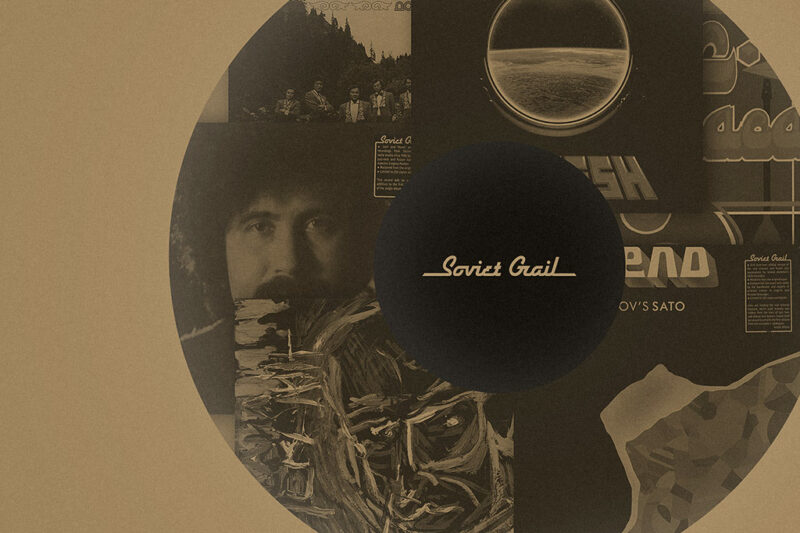You can find the Vinyl records of Soviet Grail in the [webshop of HHV Records](https://www.hhv.de/shop/en/soviet-grail-vinyl-cd-tape/i:L673N4.)
At the beginning there’s the end of history. In 1991 the Soviet Union dissolutes, socialist realism disappears, the Cold War is over. The state-owned Soviet label Meldodjia — until then the only way to officially release music in the USSR — opens up towards the west. Only a few months before everything was different: »The fact is that most creative endeavors were destroyed at the very beginning since it was almost impossible to get approval from the culture Committee« says Sergey Klimov, owner of the Russian imprint Soviet Grail. And yet the 1970s and 80s brought forth music that eluded censorship: free jazz experiments, electronic Soviet brutalism, psyched out rock and tripping funk made their rounds in the socialist underground circuits — waiting to be discovered in a different world today.
Sergey Klimov describes himself as a music archaeologist. The St. Petersburg resident digs for musical treasures from a time when one could end up in prison for playing, recording or selling the wrong music. Klimov exhibits his excavations on his Soviet Grail imprint. »The main goal of the label is to preserve the musical heritage of the former Soviet republics. The music must be heard, and the story of its creation must be told«, he says. Back in 2006 Klimov started collecting records, first hip-hop, later electronic music. As his taste in music changed, he stumbled upon roots of jazz, soul and funk until he immersed himself in psychedelic rock of the 70s. The stranger and more exotic the music got, the more it fascinated him. »I plunged headlong into the Soviet music scene in search of psychedelia, groove and electronics. And I literally drowned in new discoveries.«
In 2013 Sergey Klimov founds ZBS Records, a platform for current representatives of the Russian music scene. »We are talking about a time slice from the beginning of the noughties to the present. And everything that happened before the actual collapse of the Soviet Union belongs to the Soviet Grail catalog« says Klimov who initiated Soviet Grail in 2017. »I began to find modern bootlegs with rare Soviet-era music on the Internet. This fact seriously upset me since I’ve always believed and continue to believe that any activity should be carried out within the framework of the law as well as common sense. And musicians should be rewarded for their work in the most worthy way. Therefore, the very fact of bootlegs’ appearance became not the only but still a certain kind of accelerator to action for me«, he explains. However, Klimov started to be not only interested in officially reissuing rare pearls from the Soviet era, but also in opening something that had been lost over the years. Some records didn’t make it through censorship, others dusted in the archives of musicians and recording studios. Klimov wants to excavate them. »I can say that I found myself in this work«, he says.
»I plunged headlong into the Soviet music scene in search of psychedelia, groove and electronics. And I literally drowned in new discoveries.«
Sergey Klimov
Reissuing records from the USSR era is, however, a more difficult endeavor than releasing new music. »Since most of the musicians of those years are already aged and do not use social networks I have to do real detective work. But it is worth noting that in most cases the musicians of many bands knew each other well in the Soviet era, so when I had found some of them I was able, not without their help, to find other ensembles that interested me.« In this sense, Soviet Grail takes on encyclopedic nature. You don’t just hear the music, you also get to know the background of the bands. For this, Sergey Klimov traces the history — travelling thousands of kilometers through Russia and abroad. »I try to do interviews, learn the various subtleties of recording albums, the history of the formation of bands — all firsthand. No one can tell you about it better than the musicians themselves can.«
Sometimes this work requires luck, admits Klimov. »If there were no original master tapes, I was able to find copies of them or already digitized tapes in high resolution by musicians.« However, the process of reissuing remains complicated: »Some musicians took a responsible attitude to their work and bought their own master tapes from recording studios when the collapse of the USSR was already clear. But, unfortunately this was not common so most of the tapes were lost forever«, says Klimov who emphasizes that some records might never be released again. In addition, there happen to be cases when existing tapes crumble during digitization, leaving gaps during playback. »I have to replace these segments by taking the sound from the vinyl record, collecting pieces and restoring the recordings.«
Archeological reconstruction continues in 2020. Soviet Grail will release three albums from 80s jazz fusion ensemble Boomerang (Бумеранг). With records by Orlan and the Oleg Gotzkozik Quintett, Soviet Grail also continues to develop the theme of oriental jazz. »We will not ignore psychedelia in its various appearances — there will be the first time on vinyl releasing of the albums of the great Leningrad underground musician and composer Yuri Morozov: raw and overloaded hard rock and free jazz experiments«, assures Klimov. Besides, the reissue of the second album of the Kazakh ensemble Dos-Mukasan is in the pipeline as well as the only single from the funk ensemble Sintez and recordings by the Uzbek band Original. »They were banned in Soviet times due to a passion for Western culture, but you have never heard such disco before!«
You can find the Vinyl records of Soviet Grail in the [webshop of HHV Records](https://www.hhv.de/shop/en/soviet-grail-vinyl-cd-tape/i:L673N4.)









